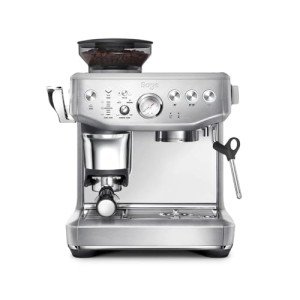Home Use Espresso Machines: A Comprehensive Guide
Espresso machines have actually ended up being a staple in numerous homes as coffee enthusiasts seek to reproduce café-quality brews in the comfort of their kitchens. The increase in popularity has led to a varied market filled with different designs, features, and rates. This post aims to supply a helpful introduction of home use espresso machines, assisting readers navigate their choices successfully.
Comprehending Espresso Machines
Espresso machines work by requiring warm water through finely-ground coffee under high pressure, leading to a concentrated coffee beverage referred to as espresso. There are several types of espresso machines categorized based on their brewing techniques and level of automation. The most typical types consist of:
- Manual Espresso Machines: These require the user to control the pressure and water circulation, permitting a more hands-on coffee-making experience.
- Semi-Automatic Espresso Machines: These use automatic control over water pressure, while the user by hand grinds and tamps the coffee.
- Automatic Espresso Machines: With the push of a button, these machines instantly manage the circulation of water, making it simpler to brew espresso with consistent outcomes.
- Super-Automatic Espresso Machines: These all-in-one machines manage grinding, tampering, brewing, and even milk frothing, making them ideal for users trying to find convenience.
- Pill or Pod Machines: These use pre-packaged coffee pods to develop espresso with minimal effort, however they limit option in developing methods and tastes.
Table: Comparison of Espresso Machine Types
| Type | Control Level | Reduce of Use | Cleaning Level | Perfect For |
|---|---|---|---|---|
| Manual | User-controlled | Moderate | High | Coffee perfectionists |
| Semi-Automatic | Partial automation | Moderate | Moderate | Home baristas |
| Automatic | Fully automated | Easy | Low | Busy individuals |
| Super-Automatic | Fully automated | Really easy | Really low | Convenience seekers |
| Capsule/Pod | Fully automated | Extremely simple | Extremely low | Casual drinkers |
Key Features to Consider
When selecting a home use espresso machine, it's vital to consider various features that can considerably impact the quality of espresso and user experience.
- Pressure: Look for machines that provide at least 9 bars of pressure, as this is considered optimal for brewing espresso.
- Boiler Systems: Single vs. dual boiler systems determine temperature level stability and the ability to brew espresso and steam milk all at once.
- Grinder: Integrated grinders enable newly ground coffee, which boosts taste. Consider Compact Espresso Machines with adjustable grind settings.
- Milk Frother: For those who take pleasure in cappuccinos and lattes, an integrated steam wand or automatic frother is important.
- Size and Design: Consider your kitchen area space and visual choices. Machines can be found in various sizes, from compact to big setups.
- Rate: Home espresso machines can range from a couple of hundred to numerous thousand dollars, so it's important to develop a budget before checking out options.
Pros and Cons of Home Use Espresso Machines
| Pros | Cons |
|---|---|
| Benefit of brewing coffee in the house | Initial investment can be high |
| Quality of espresso is frequently superior | Needs some ability, specifically with manual machines |
| Capability to experiment with flavors | Upkeep and cleansing can be labor-intensive |
| Can conserve cash in the long run | Not all machines will fit every coffee preference |
Upkeep and Cleaning Tips
Preserving an espresso machine is vital for prolonging its life and making sure consistent brew quality. Here are some beneficial tips:
- Regular Descaling: Minerals from water can develop in the machine. Descale every 1-3 months, depending on water hardness.
- Daily Cleaning: Rinse portafilters, baskets, and steam wands after each use to prevent coffee oils from building residue.
- Use Filtered Water: This can help lower mineral buildup and enhance the taste of coffee.
- Replace Gaskets and Seals: These parts may use out with time and needs to be replaced to preserve pressure and efficiency.
- Check out the Manual: Each machine has particular care instructions; following these will guarantee longevity.
FAQs About Home Use Espresso Machines
Q1: What is the best budget espresso machine? Compact Espresso Machines depends on specific requirements, but designs like the DeLonghi EC155 or the Breville Bambino are popular amongst users for providing great worth. Q2: How long do home espresso machines generally last?With appropriate upkeep, home espresso machines can last anywhere from 5 to 15 years, depending on the quality of the machine and frequency of use. Q3: Can I make cappuccinos and lattes with any espresso machine?While most espresso machines can make coffees and lattes, having a reliable
steam wand or frother is vital for accomplishing the right milk texture.
Q4: Are super-automatic machines worth the investment?For those who focus on convenience and quick developing, super-automatic machines can be worth the investment, though they might lack some customizability in brew strength and flavor. Q5: What kinds of coffee beans are best for espresso?While individual preference contributes, beans labeled as" espresso "blends are typically roasted darker, producing abundant tastes and a velvety texture when brewed.
Purchasing a home espresso machine can transform the daily coffee routine into something special, elevating home brews to café quality. By understanding the different types of machines, essential features to think about, maintenance requirements, and weighing the
benefits and drawbacks, consumers can make informed choices that match their individual preferences. As the espresso culture continues to grow, no matter the choice, every brew can be a tasty experience waiting to be savored.

